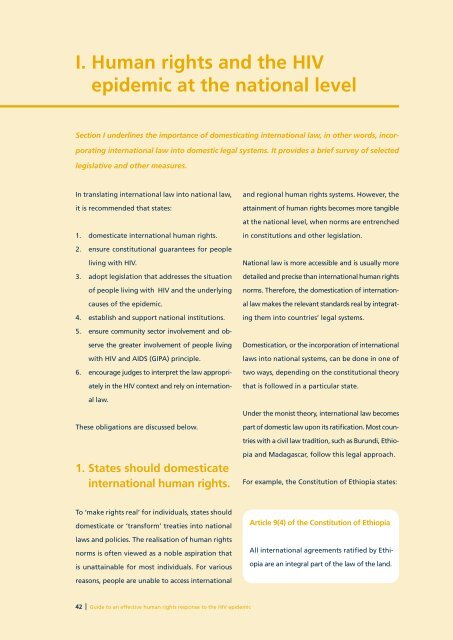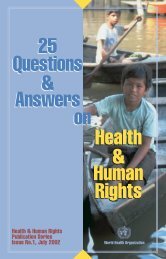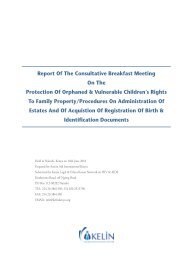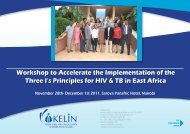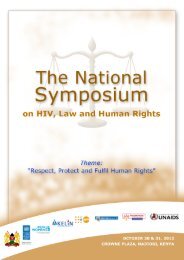Guide to an effective human rights response to the HIV epidemic
Guide to an effective human rights response to the HIV epidemic
Guide to an effective human rights response to the HIV epidemic
Create successful ePaper yourself
Turn your PDF publications into a flip-book with our unique Google optimized e-Paper software.
I. Hum<strong>an</strong> <strong>rights</strong> <strong>an</strong>d <strong>the</strong> <strong>HIV</strong><br />
<strong>epidemic</strong> at <strong>the</strong> national level<br />
Section I underlines <strong>the</strong> import<strong>an</strong>ce of domesticating international law, in o<strong>the</strong>r words, incorporating<br />
international law in<strong>to</strong> domestic legal systems. It provides a brief survey of selected<br />
legislative <strong>an</strong>d o<strong>the</strong>r measures.<br />
In tr<strong>an</strong>slating international law in<strong>to</strong> national law,<br />
it is recommended that states:<br />
<strong>an</strong>d regional hum<strong>an</strong> <strong>rights</strong> systems. However, <strong>the</strong><br />
attainment of hum<strong>an</strong> <strong>rights</strong> becomes more t<strong>an</strong>gible<br />
at <strong>the</strong> national level, when norms are entrenched<br />
1. domesticate international hum<strong>an</strong> <strong>rights</strong>.<br />
in constitutions <strong>an</strong>d o<strong>the</strong>r legislation.<br />
2. ensure constitutional guar<strong>an</strong>tees for people<br />
living with <strong>HIV</strong>.<br />
3. adopt legislation that addresses <strong>the</strong> situation<br />
of people living with <strong>HIV</strong> <strong>an</strong>d <strong>the</strong> underlying<br />
causes of <strong>the</strong> <strong>epidemic</strong>.<br />
4. establish <strong>an</strong>d support national institutions.<br />
National law is more accessible <strong>an</strong>d is usually more<br />
detailed <strong>an</strong>d precise th<strong>an</strong> international hum<strong>an</strong> <strong>rights</strong><br />
norms. Therefore, <strong>the</strong> domestication of international<br />
law makes <strong>the</strong> relev<strong>an</strong>t st<strong>an</strong>dards real by integrating<br />
<strong>the</strong>m in<strong>to</strong> countries’ legal systems.<br />
5. ensure community sec<strong>to</strong>r involvement <strong>an</strong>d observe<br />
<strong>the</strong> greater involvement of people living<br />
with <strong>HIV</strong> <strong>an</strong>d AIDS (GIPA) principle.<br />
6. encourage judges <strong>to</strong> interpret <strong>the</strong> law appropriately<br />
in <strong>the</strong> <strong>HIV</strong> context <strong>an</strong>d rely on internation-<br />
Domestication, or <strong>the</strong> incorporation of international<br />
laws in<strong>to</strong> national systems, c<strong>an</strong> be done in one of<br />
two ways, depending on <strong>the</strong> constitutional <strong>the</strong>ory<br />
that is followed in a particular state.<br />
al law.<br />
Under <strong>the</strong> monist <strong>the</strong>ory, international law becomes<br />
These obligations are discussed below.<br />
1. States should domesticate<br />
international hum<strong>an</strong> <strong>rights</strong>.<br />
part of domestic law upon its ratification. Most countries<br />
with a civil law tradition, such as Burundi, Ethiopia<br />
<strong>an</strong>d Madagascar, follow this legal approach.<br />
For example, <strong>the</strong> Constitution of Ethiopia states:<br />
To ‘make <strong>rights</strong> real’ for individuals, states should<br />
domesticate or ‘tr<strong>an</strong>sform’ treaties in<strong>to</strong> national<br />
laws <strong>an</strong>d policies. The realisation of hum<strong>an</strong> <strong>rights</strong><br />
norms is often viewed as a noble aspiration that<br />
is unattainable for most individuals. For various<br />
Article 9(4) of <strong>the</strong> Constitution of Ethiopia<br />
All international agreements ratified by Ethiopia<br />
are <strong>an</strong> integral part of <strong>the</strong> law of <strong>the</strong> l<strong>an</strong>d.<br />
reasons, people are unable <strong>to</strong> access international<br />
42 | <strong>Guide</strong> <strong>to</strong> <strong>an</strong> <strong>effective</strong> hum<strong>an</strong> <strong>rights</strong> <strong>response</strong> <strong>to</strong> <strong>the</strong> <strong>HIV</strong> <strong>epidemic</strong>


